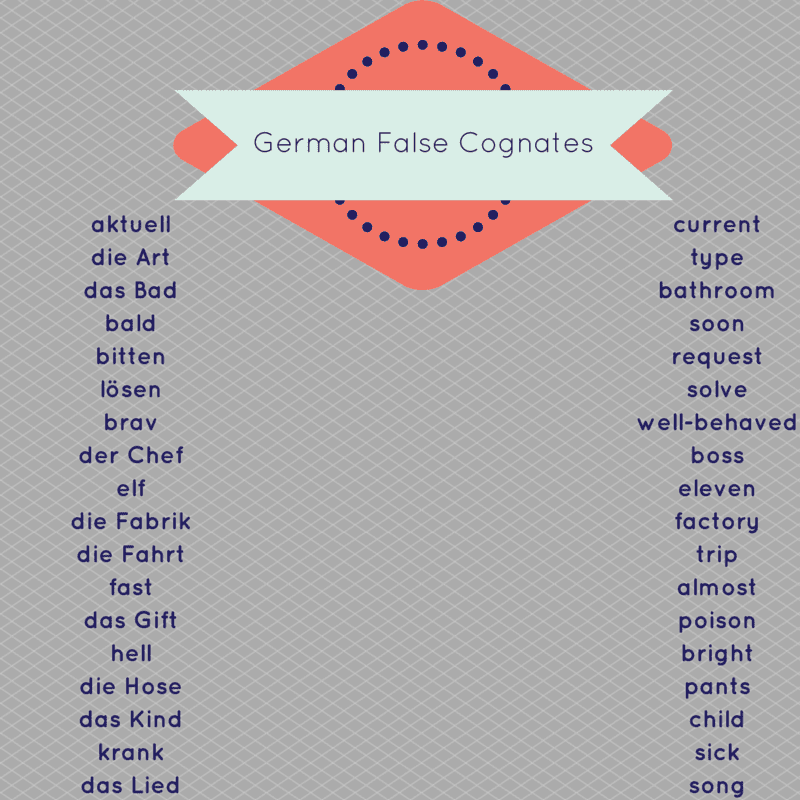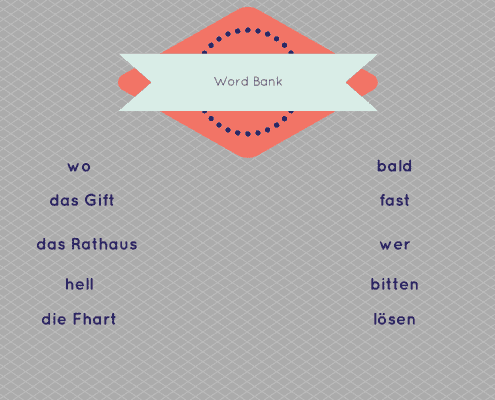German grammar can be difficult to master. Below, German teacher Noel S. shares a list of the most common false cognates, as well as exercises you can do to memorize these important words…
Students learning German are often relieved to hear that they already have a “head start” from the many recognizable German words that share the same English meaning, also known as cognates. Cognates are a great for learning German, as students have already developed mental associations with words and their definitions.
However, one must look out for false cognates—two words appearing to be similar or the same, but with different meanings. It’s important that you learn the many German false cognates, or you could make a major linguistic mistake, like I did in the story below.
When I noticed a big bandage on my friend’s elbow, I pointed to it and remarked, “Du hattest einen Abfall!” I had meant to say, “You had an accident!” but what I really said was, “You had a garbage!” – as if he had trash on his arm.
What is an Example of a False Cognate?
German is a notoriously difficult language for English speakers to learn. Part of the reason for this is the large number of false cognates, words that appear to be similar to English words but actually have a different meaning. For example:
- The German “gift” means poison, while the English word gift means a present.
- Damit (which means with it, not dam)
- Krank (which means sick, not rank)
- Qual (which means torture, not qualm).
These false cognates can trip up even experienced German speakers, so it’s important to be aware of them when learning the language.
The best way to familiarize yourself with these German false cognates is to take German lessons with a skilled teacher. You’ll learn everything you need to know in order to tell the difference between them all, as well as fun German speaking skills like those you see in the video below:
https://www.youtube.com/watch?v=rogkJR2TkUg
What is a German Cognate?
A cognate is a word that is related to another word in the same language or from a different language. German cognates are words that are related to English words. The word “cognate” comes from the Latin word “cognatus,” which means “born together.”
German and English share many cognates because they are both Germanic languages. This means that they share a common ancestor. When English was first spoken, it was very similar to German.
Over time, the two languages have changed and evolved, but they still have many similarities. For example, the German word “Haus” is cognate with the English word “house.” The German word “Kinder” is cognate with the English word “kid.” And the German word “Vater” is cognate with the English word “father.”
There are hundreds of German cognates, and they can be a great way to learn new vocabulary. They can also help you understand articles and other texts in German.
When you see a German cognate, you can be confident that you know what it means. Cognates can also help you sound more natural when speaking German. For example, if you want to say “I live in a house,” you can say “Ich wohne in einem Haus.”
This sentence uses two cognates: “wohnen” (to live) and “Haus” (house). Using cognates can help you sound more like a native speaker of German.
What is the Nickname for a False Cognate?
A false cognate is a word that looks and sounds similar to another word in a different language but has a different meaning. False cognates are also known as false friends. The term false cognate is often used in the context of language learning, when students are first exposed to a foreign language.
False cognates can be a source of confusion and can sometimes lead to embarrassing situations. For example, the Spanish word “embarazada” looks and sounds like the English word “embarrassed,” but it actually means “pregnant.” The Spanish word for “embarrassed” is “avergonzado.”
While false cognates can be amusing, they can also be frustrating for language learners who are trying to build their vocabulary. However, with a little practice, false cognates can be easily avoided.
10 German False Cognates to Be Aware Of
Here are some examples of false cognates in German:
- das Band – This word means “tape,” not “band” as in a group of musicians.
- Das BIP – This word means “logo” or “symbol,” not “bip.”
- der Finger – This word means “finger,” not “to give someone the finger.”
- das Gift – This word means “poison,” not “gift.” Obviously, this one could lead to some serious misunderstandings!
Tips for Mastering False Cognates German English Learners Should Know
It’s better to advance in your linguistic skills than to make funny mistakes like the one I did above. So, let’s explore the most common German words that look and sound like English words, but have different meanings.
Now that you’ve familiarized yourself with the common false cognates above, what can you do to create neural pathways connecting new meanings for these German words? Try making associations with words related to the false cognate in German. For example, Ratten/das Gift (rats/poison) or Fahrt/schön (a nice/beautiful trip).
Word Bank German False Cognates Activity
You can also practice by using these words in a sentence. Complete the following sentences by inserting the correct German word from the word bank below. Try not to look at the English version before trying to figure out on your own which word should be placed in the sentence.
1. Wir sollen _______ essen. I fühle mich hungrig!
We should eat _______. I feel hungry!
2. _______ ist meinen Rock? Ich kann ihn nicht finden.
_______ is my skirt? I can’t find it.
3. Ich habe die Schweiz besucht. _______war sehr schön!
I have visited Switzerland. ________ was very beautiful!
4. Meine Garage hat Ratten. Ich werde ________ kaufen.
My garage has rats. I will buy _______.
5. Meine Sommerkleidung sind _______er. Ich trage dunkle Kleidung im Winter.
My summer clothes are _______. I wear dark-colored clothes in winter.
German English False Cognates – Pay Attention and You’ll Have No Problems
False cognates are words that look similar in English and German but have different meanings.
There are many false cognates in the German language, so it is important to know which ones to watch out for.
By being aware of these differences, you will be able to form correct sentences with less effort and fewer mistakes.
Don’t be fooled by the false cognates above. Work with a German teacher to find other unique ways of memorizing these common words and perfecting your German grammar!
 Noel S. teaches German and music lessons in Beachwood, OH. He minored in German during his undergraduate studies and holds a Masters degree in music from Dusquesne University. Noel has been teaching since 2001. Learn more about Noel.
Noel S. teaches German and music lessons in Beachwood, OH. He minored in German during his undergraduate studies and holds a Masters degree in music from Dusquesne University. Noel has been teaching since 2001. Learn more about Noel.
Photo by Jared Tarbell
Suzy S.




